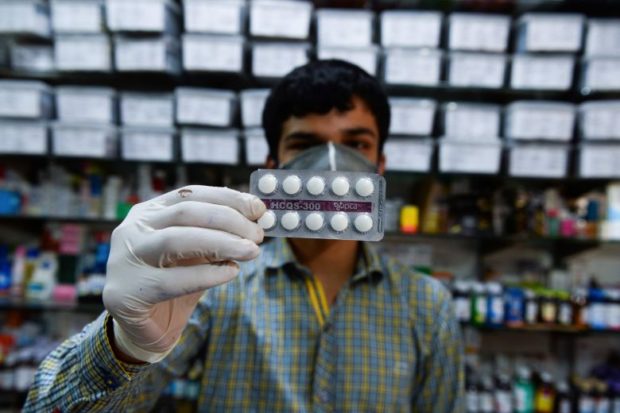Coronavirus: ‘Pharmacy of the world’ India in overdrive

A pharmacy employee in New Delhi with hydroxychloroquine tablets, the malaria drug touted by some as a Covid-19 treatment. AGENCE FRANCE-PRESSE via The Straits Times/Asia News Network
NEW DELHI — India’s ability to deliver cost-effective and quality generic drugs, such as those that helped millions living with HIV, earned it the reputation of being the “pharmacy of the world”.
This attribute has come into greater salience amid a global quest for potential treatment options and vaccines for Covid-19.
Indian pharmaceutical companies, for instance, quickly ramped up production of hydroxychloroquine in April and are now helping to meet a surging demand for an anti-viral drug believed to aid in the treatment of Covid-19 patients.
Last month, Gilead Sciences, an American pharmaceutical firm, signed a non-exclusive voluntary licensing agreement with four generic pharmaceutical firms based in India, allowing them to manufacture remdesivir for distribution in 127 countries and territories. It also permits them to set the price for their products.
The drug has been authorized for emergency use to treat Covid-19 patients, including in the United States and India.
Article continues after this advertisementAs of January, the firm had remdesivir stocks to treat 5,000 patients. Backed by manufacturers in India and elsewhere, it hopes to increase its availability to more than a million treatment courses by December, assuming a 10-day treatment course.
Article continues after this advertisementThere is also a good chance that any eventual vaccine against the coronavirus will be mass-produced in India if it has to be widely available. Among the front runners is the Pune-based Serum Institute, the world’s largest vaccine-maker by number of doses, which exceed 1.5 billion a year.
On Thursday, AstraZeneca announced a licensing agreement with it for a vaccine it is co-developing with the University of Oxford.
Under this agreement, the Indian firm will supply one billion doses for low-and middle-income countries, with a commitment to provide 400 million before year end.
“Every country needs access to vaccines and drugs for Covid-19. So the demand, if something is found to be effective, is going to be huge,” said Ms Leena Menghaney, the South Asia head of Doctors Without Borders’ Access Campaign.
“In that context, you need scaled-up manufacturing, and the fact that India has that capacity means it will play a global role.”
Around 30 groups in India, ranging from industry players to academics, are trying to develop coronavirus vaccines.
Among them is a collaboration between Indian Immunologicals Limited (IIL) in Hyderabad and Griffith University in Australia to produce an attenuated vaccine. It uses codon de-optimization technology that reduces the ability of the coronavirus to replicate itself in a human host.
If things proceed according to plan, the vaccine should enter the animal testing stage by the end of this year with some initial quantities ready for the market next year.
“The challenge is a global challenge,” IIL’s deputy managing director Prasanna Deshpande told The Straits Times. “We are going to need multiple approaches so that at least some approaches become successful, and we need multiple organizations to make it because no one company can supply the entire globe.”
There are indigenous vaccine efforts, too, that could help keep the cost of a potential vaccine lower than those developed with foreign collaboration.
Indian Institute of Technology (IIT) Guwahati and the Ahmedabad-based Hester Biosciences are working together to develop a recombinant vaccine. It relies on using an attenuated, or weakened, poultry virus, which will be reared in embryonated eggs with a coronavirus gene built into it.
Dr Sachin Kumar of IIT Guwahati, who is working on the vaccine, said he expects to turn it over to Hester Biosciences for animal trials by the end of this year. “If it works out, the vaccine will be in the form of an intra-nasal spray and will be very cost-effective,” he said.
India is also testing herbal-based treatments for Covid-19.
However, Ms Menghaney cautioned against exclusionary licensing agreements. “Big pharma companies tend to offer agreements that are more aimed at controlling the market, and exclude the majority of the middle-income and high-income countries,” she said.
Gilead’s agreement on remdesivir leaves out Singapore, Malaysia, China, Brazil, Russia, the US and most European countries, among others. This means patients in these countries could end up paying more for the drug.
“That’s literally half the population of the world. Such an approach cannot work when it comes to Covid-19. Countries have to pool capacities to ensure access to vaccines and medicines remains equitable.”
For more news about the novel coronavirus click here.
What you need to know about Coronavirus.
For more information on COVID-19, call the DOH Hotline: (02) 86517800 local 1149/1150.
The Inquirer Foundation supports our healthcare frontliners and is still accepting cash donations to be deposited at Banco de Oro (BDO) current account #007960018860 or donate through PayMaya using this link.